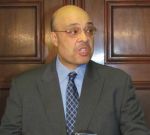On April 12, 2011, District 9 Councilman Rev. Ricky Burgess proposed legislation calling for the elimination of inquires about criminal history from job applications in city government hiring. In the months since, the “Ban the Box” initiative, being led at the community level by Dean Williams, founder of the Formerly Convicted Citizens Project, has been unable to gain traction in City Council.
 |
| REV. RICKY BURGESS
|
“I have been working with community groups to draft legislation that would expand Ban the Box,” said Burgess. “We have actually composed several drafts. I have forwarded them to the law department and I am waiting for their review.”
The originally drafted legislation was only aimed at hiring practices for city government and contractors who work with the city. Now FCCP has been working to expand the legislation to include private Pittsburgh vendors and employers.
“My initial legislation was just to do city government. I’ve been hesitant because I don’t know that we have the authority to (include private employers),” Burgess said. “There’s support from members of council. I think there are members who absolutely support this endeavor. I just want to make sure the legal groundwork is there to withstand any challenge.”
According to a document drafted by a lawyer hired by Williams, the amendment to include private employers in the legislation would be legal under the city’s charter. However, Burgess said the only legal opinion that will count would be the city solicitor’s.
“One of the council members suggested getting a legal document to show that the city could do this legally,” Williams said. “I’ve pretty much done everything I can to bring this information to the public eye and just generally to gain support. We really feel confident that the city is behind this.”
Under the proposed legislation, employment applications would no longer be able to include questions regarding an applicant’s criminal background. While questions about criminal convictions could later be asked during the interview process, the idea is to give formerly convicted applicants a chance to showcase themselves during the interview, instead of being preemptively eliminated.
“There’s a lot of people who as a result of this issue are very diligent and they would make great employees. All of those people who have been convicted of minor crimes or crimes of the past are being disenfranchised,” Williams said. “You’re not exacting affirmative action on employers, you’re just keeping them from enforcing blanket discrimination.”
The legislation has had a long journey in council since it was first introduced in 2011. In April 2011, the bill was set for a preliminary vote, which was later postponed pending a public hearing. The bill reemerged in November 2011, but was again tabled.
The only recent development pertaining to the legislation is the newly formed partnership between The Formerly Convicted Citizens Project and the Aleph Institute, a Jewish organization working to help formerly convicted Jews find jobs.
“After paying their dues to society, they’re treated as second class citizens. Even people who don’t have a criminal record are having trouble finding jobs, so they are using these convictions to weed out candidates,” Williams said. “You’re talking about a large number of people coming back to the community, so how is that going to impact the community?”
Williams said at least four other council members have expressed support for the legislation. Multiple phone calls to District 6 Councilman R. Daniel Lavelle and Council President Darlene Harris were not returned.